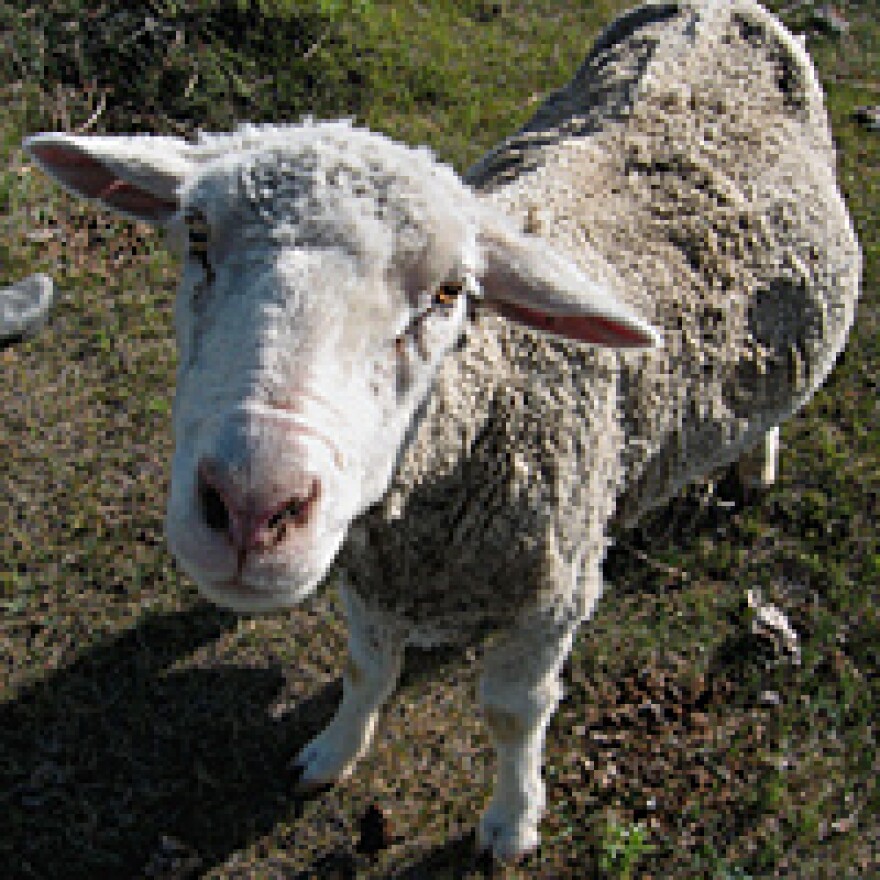

Protecting livestock from coyotes and wolves has long been a preoccupation of Western ranchers. In the past, they could set out a carcasses laced with poison to lure the predators and kill them. But after that technique was outlawed, ranchers had to find alternatives. That's where livestock guardian dogs come in.
When Cat Urbigkit drives her pickup out to check on her 140 ewes each morning, she's usually very popular — she often stuffs shortbread cookies in her pocket.
But on this day, her livestock guard dog, named "Love's Girl," is hiding. Look closely, and there's a white speck behind some sage brush.
"She likes me. I'm her friend — she knows I feed her, but she doesn't have a great interest in coming to see me," Urbigkit said. "She loves her sheep far more than she loves any human."
Love's Girl is an Akbash, a breed of dogs originally from Turkey.
Urbigkit raises the livestock guard dogs so that they bond with sheep more than humans. When they're puppies, their beds are made of wool. They're allowed to sleep with the sheep, and they take naps on sheep pelts.
Love's Girl spends much of her day napping; that's because she works at night, scaring away predators like coyotes and wolves with her throaty bark. She's been very busy lately, and not just with her guard duties. A couple of months back, she gave birth to seven puppies that eventually will be sold to other ranchers.
The animals sell for about $300 when they're 5 months old or so. An experienced adult guard dog can sell for more than $1,000. The Akbash are one of the most popular working-dog breeds because they have a guardian instinct, according to Colorado State University Professor Bill Andelt. He studies animal behavior in CSU's Department of Fish, Wildlife and Conservation Biology.
Andelt says nothing is as effective as what ranchers used to do — set out a poison-laced carcass for coyotes and wolves to eat. But that's not allowed anymore, and among the remaining options, guard dogs are one of the most effective.
"If we compare them to trapping, and if we compare it to going out and shooting coyotes ... (or) frightening devices, I'd say they likely are just as successful and perhaps more successful than some of those techniques," Andelt said.
Some ranchers also use llamas or donkeys to protect livestock. Andelt says they're less effective, but they are good alternatives in pastures next to a highway, where dogs might run into traffic.
As wolves re-populate the West, Andelt says even guard dogs will have difficulty keeping them away from livestock.
"If you have one guard dog and one wolf, the guard dog might fare pretty well in a conflict," Andelt said. "But if we end up with only one or two guard dogs and if there's a half-dozen wolves, I wouldn't bet on the guard dog."
Urbigkit said at least six of the dogs she has raised in the past eight years have been killed by wolves. Still, she said, she'd lose a lot more lambs if it weren't for her guard dogs.
Plus, she said, "I have figured out a way to have puppies in my life, almost all the time! And what could be better than that?"
Copyright 2023 NPR. To see more, visit https://www.npr.org.



